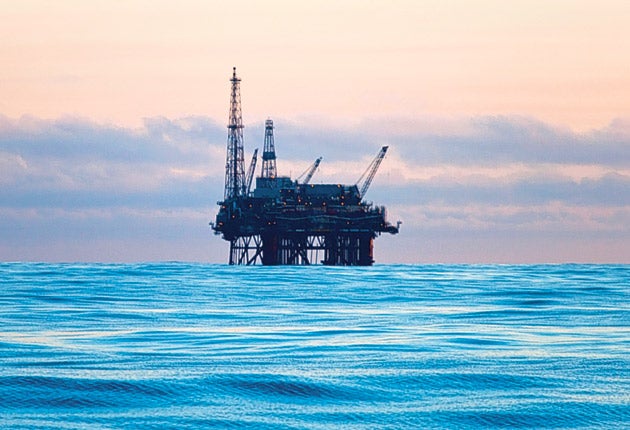Deep-water oil drilling: banned in America, allowed here

Oil companies have been given the go-ahead to press on with the hunt for oil and gas in the deep waters off the coast of Britain despite the environmental disaster in the Gulf of Mexico.
BP, whose Deepwater Horizon rig has been spilling up to a million gallons of oil a day into the fragile waters off the southern United States, is leading the drive to exploit the North Sea's remaining hydrocarbons. The British Government has said it has no plans to follow the United States and Norway by introducing a moratorium on new deep-water drilling activities in the still largely untapped area to the west of Shetland.
The notoriously stormy waters on the edge of the continental shelf are home to up to 20 per cent of the UK's existing oil and gas reserves, and the energy minister Charles Hendry said it was "in the national interest" to continue to develop indigenous resources. But many environmentalists believe that ministers are poised to offer another huge tax incentive to energy companies to promote drilling there. In January Labour announced £160m relief on each new gas field opened up off Shetland. The Chancellor, George Osborne, is thought likely to review the tax arrangements for offshore drilling after canvassing the multinationals before the election on how best to promote further deep-water exploration and reduce Britain's reliance on imports. The Conservatives also promised to make it "simpler" for big companies to get licences to drill for hydrocarbons.
Four fields are currently producing oil west of the islands where in 1993 the MV Braer, carrying 85,000 tonnes of crude oil, ran aground in hurricane-force winds. A further 113 exploration licences have been approved and applications for another 57 are pending, with a decision due by next year, according to figures from the Department of Energy and Climate Change.
The Energy Secretary, Chris Huhne, said this week that he had reviewed regulations on existing gas and oil exploration after the Gulf of Mexico disaster. Announcing an increase in the number of offshore inspectors and the setting-up of a new industry group to report on the UK's ability to cope with a major spill, he concluded the present regime was "fit for purpose". He said much had been learnt since the Piper Alpha disaster of 1988, in which 167 people died, and insisted the regime was "among the most robust in the world".
The number of spills recorded in UK waters has continued to decline. The most recent figures show that in 2008 there were 272 incidents, resulting in 37 tonnes of oil being lost in the sea – down from 432 accidents and 61 tonnes spilled in 2005. BP has been exploiting the area off Shetland since the 1970s but stepped up production in the mid-1990s as other reserves in more accesible areas ran dry. All three of its platforms are operating at depths of around 500m – deeper than in the rest of the North Sea but much shallower than in the Gulf of Mexico, where engineers are operating at 1,600m. It plans to begin drilling an exploration well at North Uist, 1,300m below the surface, in the autumn. A spokesman for the company confirmed it was continuing to work at one field off Shetland with its Swiss-based contractor Transocean, with whom it has been involved in bitter recriminations since the blow-out at Deepwater Horizon. The company said it still has "bold investment plans" for the North Sea where it is determined to reverse the decline in production and maintain output at around 300,000 barrels a day.
The industry body Oil & Gas UK said contingency plans had been rehearsed to prevent oil coming to shore in the event of a spill and that the rough conditions off Shetland would help dispel pollution. Mike Tholen, the association's economics director, said: "As exploration and development there progress, the safety of the workforce and protection of the marine environment will be paramount."
But Joss Garman, a Greenpeace energy campaigner, urged the new Government to "use [the Gulf of Mexico] crisis as an opportunity to end our addiction to oil and lead moves towards a new business model that is centred on clean energy".
Join our commenting forum
Join thought-provoking conversations, follow other Independent readers and see their replies
Comments
Bookmark popover
Removed from bookmarks